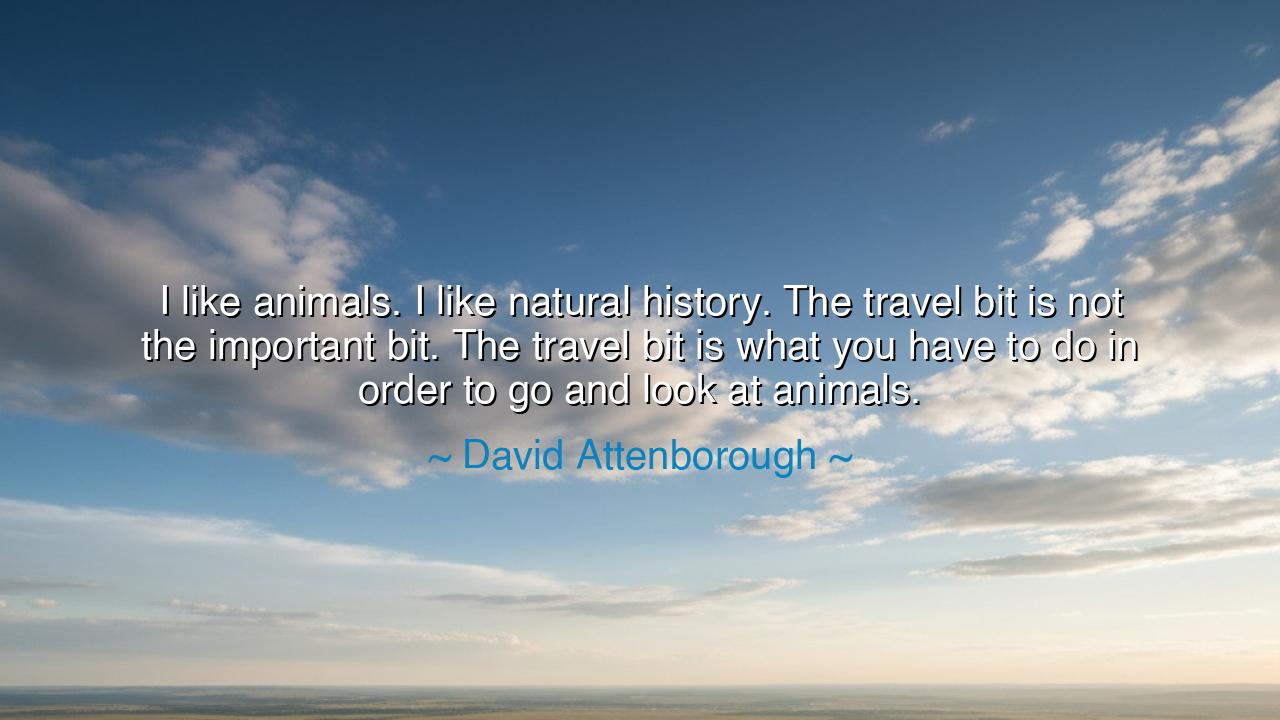
I like animals. I like natural history. The travel bit is not
I like animals. I like natural history. The travel bit is not the important bit. The travel bit is what you have to do in order to go and look at animals.






David Attenborough, guardian of the natural world, once said: “I like animals. I like natural history. The travel bit is not the important bit. The travel bit is what you have to do in order to go and look at animals.” Though his words seem simple, they conceal a profound lesson about purpose, passion, and the endurance required to pursue truth. For he reminds us that journeys are not always for their own sake, but for what lies at their end—the vision, the encounter, the revelation.
When Attenborough says “I like animals”, he is speaking not only of preference, but of devotion. His life’s work has been to witness, record, and honor the creatures of the earth. To him, the wonders of natural history are treasures greater than jewels, each bird, insect, or beast a living scripture of creation. The travel is but the necessary bridge, the price to be paid to behold such marvels. In this, he reveals the truth that labor and inconvenience mean little when weighed against the joy of one’s true calling.
The ancients too knew this. Think of Herodotus, who journeyed across strange lands, not for the sake of travel itself, but to gather stories of peoples and kingdoms. Or recall Alexander von Humboldt, the great explorer-scientist, who endured jungles, volcanoes, and rivers, not because he craved hardship, but because he longed to record the secrets of nature. The road is often hard, but the vision at its end redeems the struggle. Attenborough stands in this lineage: the road, the ship, the plane—these are but tools to reach the heartbeat of the wild.
And there is wisdom here about purpose. Many men chase the glamour of travel itself—the prestige of faraway places, the novelty of exotic sights. But Attenborough teaches otherwise: the destination is not the point, the encounter is. Without the animals, without the truth of the natural world, the travel would be empty. So too in life, we must ask ourselves: are we walking merely for the road, or for the truth that waits at the road’s end?
His words also speak to endurance. For the path toward one’s calling is seldom smooth. There are flights delayed, jungles to cross, sicknesses to bear, loneliness to endure. But if the vision is clear, one bears these things gladly. The saints endured exile for their faith, the explorers braved oceans for their discoveries, and the scholars studied long nights for a glimpse of wisdom. So too, Attenborough accepts the weight of travel, because his heart is fixed on the prize—witnessing life itself in its purest forms.
The lesson, then, is simple yet powerful: fix your eyes on what matters most. Do not be distracted by the inconveniences or the difficulties of the road. If your purpose is true, you will endure them with joy. Let the hardships be bridges, not barriers. Let the labor be sanctified by the vision. For in the end, it is not the road that defines you, but the treasure you seek beyond it.
So I say unto you, children of tomorrow: find your own “animals,” your own vision that stirs your soul. And when you find it, accept the travel, the toil, the sacrifice, not as burdens, but as the necessary passage to your calling. For as David Attenborough teaches, the road itself is not the glory—it is what the road delivers you to that makes the journey worth everything.
And let his words be etched in memory: “The travel bit is not the important bit. The travel bit is what you have to do in order to go and look at animals.” Thus may you endure the roads of your own life, never mistaking the bridge for the destination, and never losing sight of the wonder that called you forth.






AAdministratorAdministrator
Welcome, honored guests. Please leave a comment, we will respond soon